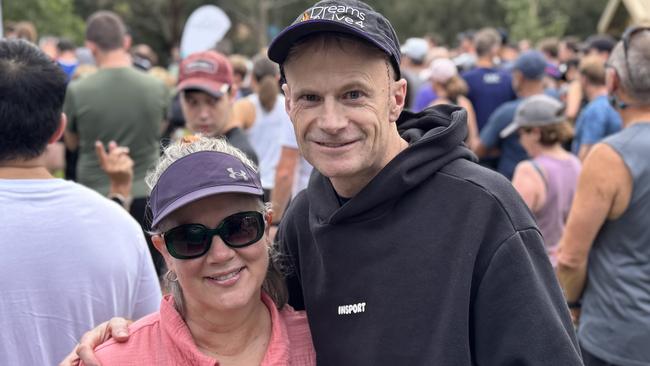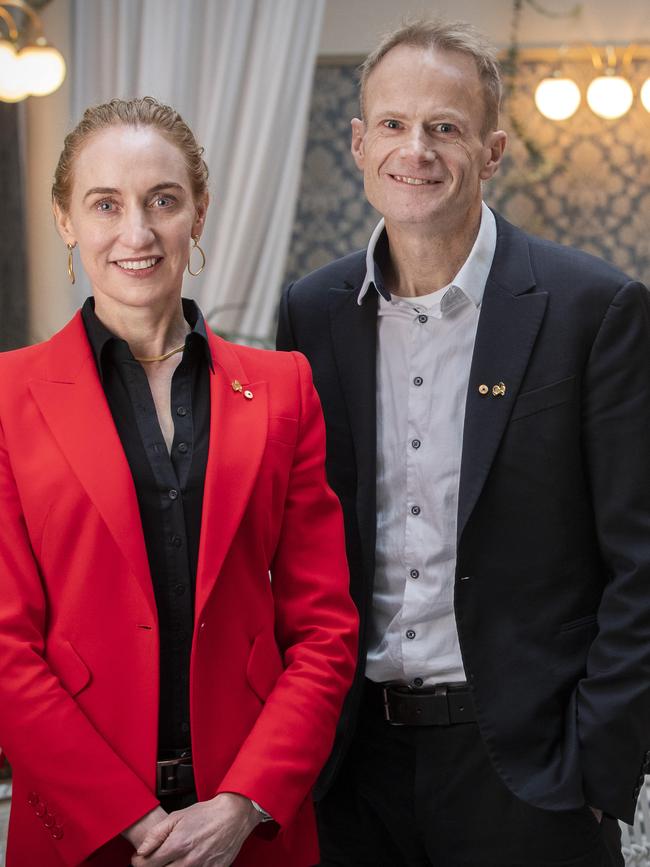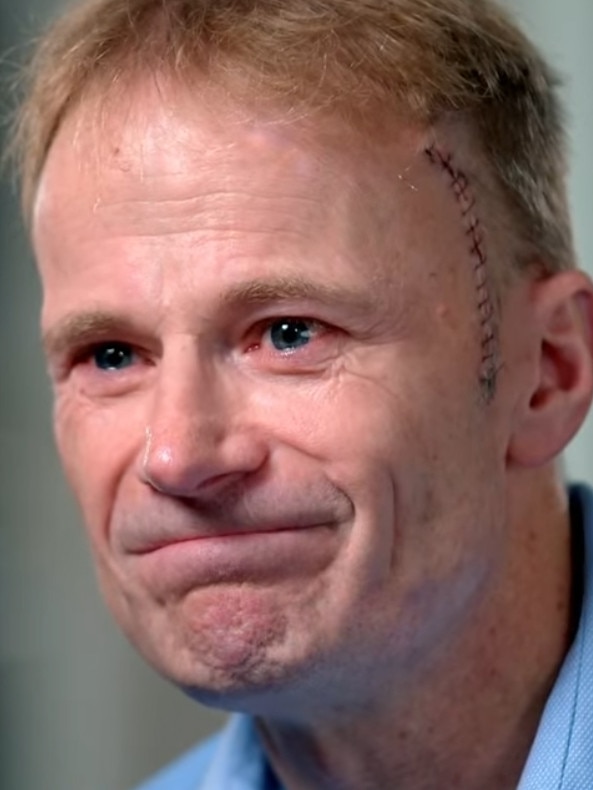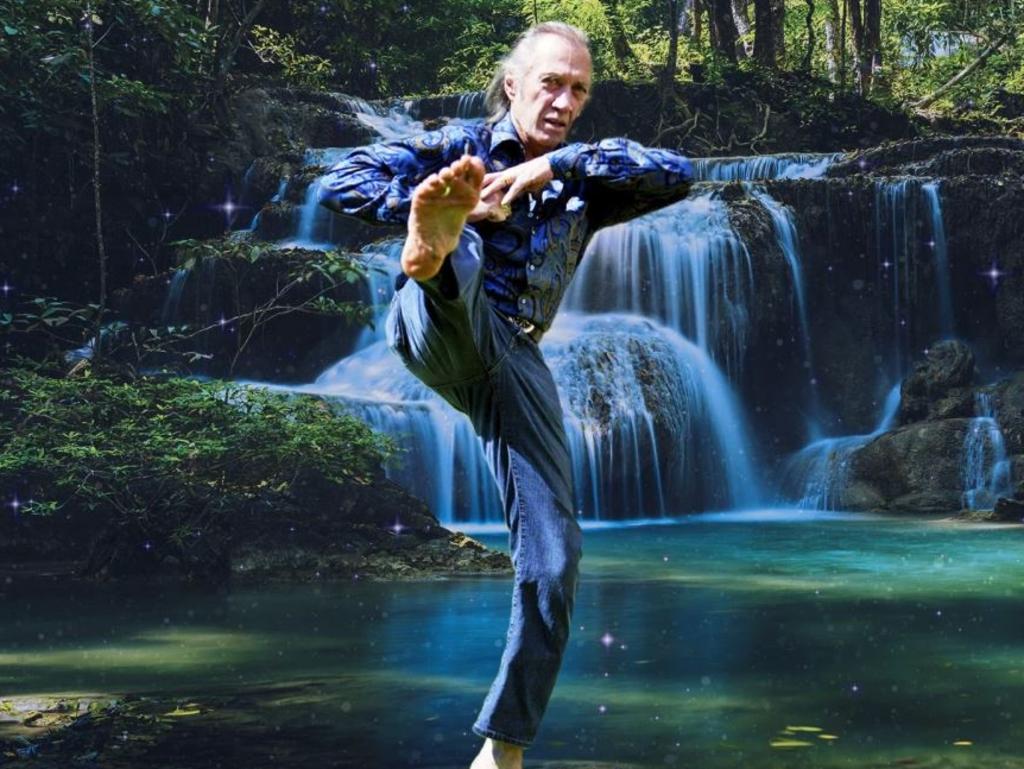‘It’s upsetting’: Richard Scolyer on his latest cancer diagnosis and his hopes for the future
Renowned scientist Richard Scolyer says while he has only months to live, his survival ‘gives a lot of hope’ to the efficacy of the experimental immunotherapy he trialled.

Professor Richard Scolyer feels “lucky” that he will be able to spend more time with his wife and family, even though he is “on the downhill route” after a devastating operation last week that revealed his brain cancer had returned and he may have only months to live.
It’s a cruel irony that former Australian of the Year may not be alive to witness the clinical trials he hopes will validate the experimental brain cancer treatment he has received.
He is recovering at home after undergoing “complex” brain surgery last week to determine the cause of “abnormalities” detected during recent scans.
The surgery identified a large volume of quickly growing brain cancer in the left of his brain. While some of the tumour was removed, not all of the tumour could be removed due to its difficult location.
“I was devastated to find out that my brain cancer has come back,” he told The Australian. While his prognosis is not favourable, he said he was proud to be alive and for all that his case had contributed to science.
“Seventy-five per cent of people who have standard therapy with the sort of brain cancer I’ve got, recurred within 12 months, and I didn’t have some of the normal therapy,” he said. “So, the fact that I’m still here and functioning pretty well at whatever it is – 21 months, the 20th of May is when it presented – I felt lucky in that regard.
“It’s obviously sad when you’ve found things that mean you’re on the downhill route; it’s upsetting. It’s disappointing but on the other hand I am grateful that I’ve been able to enjoy my life, contribute to society, and spend more time with family.”
The distinguished pathologist was jointly named Australian of the Year in 2024, alongside his colleague Professor Georgina Long, for their world-leading research into advanced melanoma and their advocacy for sun-safe behaviour and cancer prevention. He has continued to provide updates on his health and the progress of scientific research via his social media accounts.

When asked if he plans to maintain his social media presence, he says it is only something he will be able to determine as his illness progresses.
Professor Scolyer, 58, this week revealed he has just months to live after doctors discovered his brain cancer recurrence. He was originally diagnosed with “the worst kind” of brain cancer, a grade 4 glioblastoma, in 2023.
Glioblastoma is one of the most complex, deadly and treatment-resistant cancers. Patients have an average survival of 12 to 18 months and, according to The Brain Cancer Centre in Melbourne, only 25 per cent of patients survive more than one year and fewer than 5 per cent survive more than three years.
When he was first diagnosed, Professor Scolyer decided, rather than undergoing the standard treatment, he would become “patient zero” for an experimental immunotherapy, pioneered by his colleague and fellow Australian cancer specialist Professor Georgina Long and her team.
Subsequent testing showed promising signs, until now. The way his cancer responded to the treatment then and over time continues to provide scientists with important insights as they work to find more effective treatments for brain cancer.
“The fact that the tumour’s recurred in me now doesn’t mean that the treatment I’ve had has been ineffective in what it’s done,” he said. “The average survival time is less than one year. The fact that I’m still alive this long gives a lot of hope that it is effective. To be a doctor who works in the field of science … the next step is to prove it in a clinical trial, before it would get instigated and given to all patients on the basis of what the tumour is.”

In late February, his case and treatment were detailed in a peer-reviewed paper published in the prestigious medical journal Nature Medicine. Its publication has paved the way for an Australian-led international clinical trial of the therapy to scientifically investigate the efficacy of the approach within a large cohort of eligible glioblastoma patients, possibly this year. Scientists hope the trial, to be conducted by the Brain Cancer Institute in Melbourne, could begin this year.
“My hypothesis was that we could administer combination immunotherapy as first line treatment before surgery to boost the immune system and activate T-cells to target the brain tumour — an approach I had previously developed successfully in both stage 3 melanoma and melanoma that had spread to the brain,” Professor Georgina Long, who was also the paper’s lead author, said at the time of its publication. “This has never been done before and what this trial will do is establish whether this approach is feasible or effective for the treatment of glioblastoma.”
Professor Scolyer’s work in melanoma research has helped to significantly improve clinical outcomes for patients. Five-year survival is now around 60 per cent. He hopes similar things can soon be achieved for brain cancer.
“Treatment hasn’t really had major changes in the last 20 years, and even back 20 years, it would just increase the average survival rate by a few months, not cure patients,” he said.
“There’s still a lot of work to be done to push it forward and fingers crossed, that’s what happens through the work that we’ve done on me and, in some respects, being courageous in going down this route. I hope ultimately, it makes a difference for many, many brain cancer patients.”
It is still unclear what Professor Scolyer’s treatment for his recurrence may look like, that is yet to be determined, but he says “spending time with my wife and family is the number one priority”.

As his next chapter begins, Professor Scolyer is still somewhat perplexed – in the best kind of way – by how much his story has captured the hearts and minds of the Australian community. He says he never expected anyone outside of his professional circle to follow his progress and be so interested in his achievements.
“I didn’t expect the general public to be interested in that story, and I’m really surprised by the kindness and support of people I’ve never met who want something to happen to try and make a difference to patients.
“I am very proud of the fact I’m still here. In the big scheme of things, I’m lucky to have been alive for as long as I have, and been able to keep contributing to society and enjoying my friendships, family and colleagues.”
As for his words of wisdom, Professor Scolyer says people should “think big, be bold, be courageous”.





To join the conversation, please log in. Don't have an account? Register
Join the conversation, you are commenting as Logout